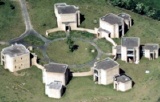Fluctuation-driven phenomena in biological systems
18 - 22 April 2016
Organisers: Louise Dyson, Stefan Grosskinsky, Thomas House, Anton Zilman
Draft Programme
Registration
Registration is now closed. Please contact the organizers if you would like to attend the workshop. All Warwick EPSRC Mathematics Symposium workshops are open to all interested parties within the mathematical sciences community in the UK and internationally, both in academia and, where appropriate, in industry.
Confirmed Speakers
Max Aldana (UNAM)
Tibor Antal (Edinburgh)
Frank Ball (Nottingham)
Golan Bel (Ben Gurion)
Joseph Challenger (Imperial)
Christina Cobbold (Glasgow)
Rob Cross (Warwick)
Jonathan Desponds (ENS Paris)
Tobias Galla (Manchester)
Jeff Gore (MIT)
Adam Kucharski (LSHTM)
Yen Ting Lin (Manchester)
Malwina Luczak (QM London)
Grant Lythe (Leeds)
Baruch Meerson (Jerusalem)
Thierry Mora (ENS Paris)
Jay Newby (UNC)
Maria D'Orsogna (UC Riverside)
Tim Rogers (Bath)
Ludger Santen (Saarbruecken)
Alex Sigal (Durban)
Orkun Soyer (Warwick)
Bartek Waclaw (Edinburgh)
Kit Yates (Bath)
Logistical information and financial support
The meeting will take place in the Zeeman Building at the University of Warwick. Information about Warwick and how to get here can be found in the links on the right.
The EPSRC has provided limited funds to support the travel and accommodation expenses of workshop participants. We expect visitors to cover travel and accommodation expenses from their own grants whenever reasonable to do so. Financial support can be requested during the registration process.
For further information contact Stefan Grosskinsky (S.W.Grosskinsky@warwick.ac.uk)
Scientific scope
One of the most striking differences between physical systems and their counterparts in the biological and social sciences is the very low signal to noise ratios in the latter compared to the former. For this reason, stochastic processes have a long history in modelling biological and social systems and have become increasingly important in epidemiology. Absorbing states and ergodic properties are key to understanding demographic stochasticity and extinction in models of population dynamics, epidemiology and biodiversity. Recent theoretical and experimental work on growth processes in time-dependent domains have led to a number of surprising discoveries such as lack of fixation in mixed evolutionarily neutral populations of bacteria. Advances in microscopy reveal the detailed workings of the molecular machinery inside individual cells in unprecedented precision, and the challenge has been posed by experimental cell biologists to the mathematical modelling community to devise biologically relevant stochastic models to interpret the surprisingly complex behaviour of these microscopic machines. In epidemiology it is increasingly realised that stochastic effects play a key role is such diverse scenarios as emergence of new pathogens, the behaviour of endemic diseases in response to school holidays, and the analysis of household data.
This workshop will bring together mathematicians with an interest in stochastic modelling with applied scientists to work on problems at the interface of mathematics and biological sciences, focusing on noise-driven phenomena in biological transport, epidemiology and biodiversity in population dynamics.
See also:
Mathematics Research Centre
Mathematical Interdisciplinary Research at Warwick (MIR@W)
Past Events
Past Symposia
Where possible, visitors should obtain an EDUROAM account from their own university to enable internet access whilst at Warwick.
You can register for any of the symposia or workshops online. To see which registrations are currently open and to submit a registration, please click hereLink opens in a new window.
Mathematics Research Centre
Zeeman Building
University of Warwick
Coventry CV4 7AL - UK
E-mail:
MRC@warwick.ac.uk

